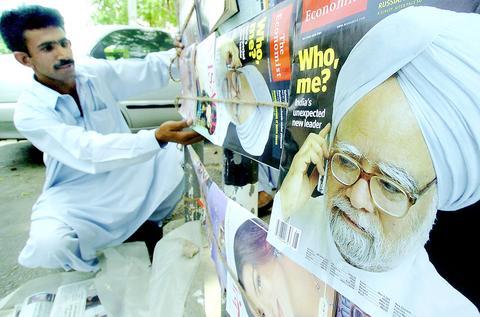Manmohan Singh, India's first non-Hindu prime minister, was preparing to announce his Cabinet yesterday, after days of political wrangling within his new ruling coalition.
Singh, 71, faced his first test as India's new leader when suspected Islamic militants blew up a paramilitary bus yesterday in insurgency-wracked Jammu-Kashmir state, killing at least 28 people and wounding 15 others.
In the new government's first meeting yesterday led by Singh, a resolution was passed condemning the attack, Cabinet member Ramvilas Paswan told reporters.

PHOTO: AFP
The new prime minister has vowed to tackle the crisis in Kashmir, where militants have been fighting for 14 years for independence or a merger with Pakistan. He also has said he wants "most friendly" relations with Pakistan, with whom India has fought two wars over control of Kashmir.
The deadly attack came less than 24 hours after Singh was sworn in Saturday, putting his Congress party back in control of the predominantly Hindu nation after eight years on the sidelines. His swearing-in also ended a week of political turmoil in which Italian-born Congress leader Sonia Gandhi declined to become prime minister.
Although 28 Cabinet members and 40 ministers of state and junior ministers were also sworn in Saturday, Singh said there were "difficulties in finalizing the Cabinet" and their portfolios were to be announced yesterday.
Singh was expected to assume the post of finance minister, a position he held from 1991 to 1996, when he introduced the most wide-ranging economic reforms in the nation's history.
During yesterday's meeting, it was also decided that parliament's new session will be held June 2 to June 10, and President A.P.J. Abdul Kalam will address a joint session of the upper and lower houses of parliament on June 7.
Also yesterday, Pakistan's Foreign Ministry said Pakistan and India agreed to postpone nuclear talks originally set for this week so the new Indian government has time to settle into power.
Singh, India's first prime minister from the Sikh minority, replaced Atal Bihari Vajpayee, whose Hindu-nationalist government was ousted by the Congress party in tumultuous elections last month and this month.
Because Congress failed to gain an outright majority in the 545-seat Parliament, it will be forced to rely on two powerful Communist parties for support from outside its coalition. That prospect spooked investors, causing them to send the Bombay Stock Exchange plunging on fears the Communists would slow economic reforms.
Markets have since stabilized, however, with Singh assuring investors that India would remain pro-growth.
Singh began his first full day in office by visiting memorials in New Delhi for four former prime ministers -- Jawaharlal Nehru, Lal Bahadur Shastri, Indira Gandhi and Rajiv Gandhi -- and independence leader Mohandas K. Gandhi.
Sonia Gandhi will continue to be the head of the Congress party. She is the widow of Rajiv Gandhi, who was assassinated by a suicide bomber in 1991, and a daughter-in-law of former Prime Minister Indira Gandhi, assassinated in 1984.

DITCH TACTICS: Kenyan officers were on their way to rescue Haitian police stuck in a ditch suspected to have been deliberately dug by Haitian gang members A Kenyan policeman deployed in Haiti has gone missing after violent gangs attacked a group of officers on a rescue mission, a UN-backed multinational security mission said in a statement yesterday. The Kenyan officers on Tuesday were on their way to rescue Haitian police stuck in a ditch “suspected to have been deliberately dug by gangs,” the statement said, adding that “specialized teams have been deployed” to search for the missing officer. Local media outlets in Haiti reported that the officer had been killed and videos of a lifeless man clothed in Kenyan uniform were shared on social media. Gang violence has left

US Vice President J.D. Vance on Friday accused Denmark of not having done enough to protect Greenland, when he visited the strategically placed and resource-rich Danish territory coveted by US President Donald Trump. Vance made his comment during a trip to the Pituffik Space Base in northwestern Greenland, a visit viewed by Copenhagen and Nuuk as a provocation. “Our message to Denmark is very simple: You have not done a good job by the people of Greenland,” Vance told a news conference. “You have under-invested in the people of Greenland, and you have under-invested in the security architecture of this

Japan unveiled a plan on Thursday to evacuate around 120,000 residents and tourists from its southern islets near Taiwan within six days in the event of an “emergency”. The plan was put together as “the security situation surrounding our nation grows severe” and with an “emergency” in mind, the government’s crisis management office said. Exactly what that emergency might be was left unspecified in the plan but it envisages the evacuation of around 120,000 people in five Japanese islets close to Taiwan. China claims Taiwan as part of its territory and has stepped up military pressure in recent years, including

UNREST: The authorities in Turkey arrested 13 Turkish journalists in five days, deported a BBC correspondent and on Thursday arrested a reporter from Sweden Waving flags and chanting slogans, many hundreds of thousands of anti-government demonstrators on Saturday rallied in Istanbul, Turkey, in defence of democracy after the arrest of Istanbul Mayor Ekrem Imamoglu which sparked Turkey’s worst street unrest in more than a decade. Under a cloudless blue sky, vast crowds gathered in Maltepe on the Asian side of Turkey’s biggest city on the eve of the Eid al-Fitr celebration which started yesterday, marking the end of Ramadan. Ozgur Ozel, chairman of the main opposition Republican People’s Party (CHP), which organized the rally, said there were 2.2 million people in the crowd, but